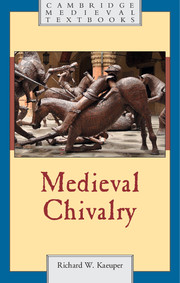Book contents
- Frontmatter
- Dedication
- Contents
- List of figures
- Acknowledgments
- Part I An approach to chivalry: was it real and practical?
- Part II Three broad chronological phases
- Part III The privileged practice of violence
- Part IV Chivalry, governing institutions, and ideals
- Part V The world of chivalric emotions
- Reflections
- Select Bibliography
- Index
Part IV - Chivalry, governing institutions, and ideals
Published online by Cambridge University Press: 05 August 2016
- Frontmatter
- Dedication
- Contents
- List of figures
- Acknowledgments
- Part I An approach to chivalry: was it real and practical?
- Part II Three broad chronological phases
- Part III The privileged practice of violence
- Part IV Chivalry, governing institutions, and ideals
- Part V The world of chivalric emotions
- Reflections
- Select Bibliography
- Index
Summary
Thinking about knights and kings will likely bring to mind vivid scenes in stories and especially films about King Arthur and his knights of the Round Table. It is easy to picture them feasting together (inconveniently wearing full plate armor) in joyous harmony, their rich goblets lifted to toast a common sense of purpose and destiny. Thinking about chivalry and the clerical hierarchy may conjure fewer vivid scenes; it requires us to recall that governing powers rested in great ecclesiastics no less than kings whose very knightliness more readily fills the eyes and mind. Yet the popular mental picture that surfaces will likely remain rosy-hued, perhaps featuring a bishop, solemn beneath his mitre, with gloved and ringed hand uplifted in blessing while knights bow heads in obedience and reverence. Both imagined scenes are not foreign to medieval life: kings, knights, and great clerics (joined by ranks of monks and parish priests) had good reason to cooperate; all knew that their thoughts operated within a common religious worldview encompassing a special role for kings and clerics as well as knights.
Yet reality was not always so simple and amicable, especially when actual and effective governing power was at issue. If harmonious scenes are readily imagined, tensions and difficulties can swiftly be spotted. A good witness can be summoned in the person of crusty old Girart, duke of Burgundy, as imagined in the great twelfth-century epic poem Chanson d'Aspremont. An utterly unreconstructed conservative, scornful of all advancing institutions of governance, he sings out an assertion of full independence from any governing authority. Though, in company with other epics, this chanson is set in an imagined Carolingian world, the poem wrestles with issues of the time of its composition. As the duke lectures Archbishop Turpin, who has been sent to secure his assistance in Charlemagne's campaign against Muslim invaders:
Now if my memory is clear,
There are three thrones chosen and set apart:
One is called Constantinople,
Rome is another, and this city makes three –
The fourth is Toulouse which is part of my heritage.
Across my own realm I have my own priests;
Never for baptism or any Christian service
Do we need the pope's authority.
- Type
- Chapter
- Information
- Medieval Chivalry , pp. 233 - 238Publisher: Cambridge University PressPrint publication year: 2016

